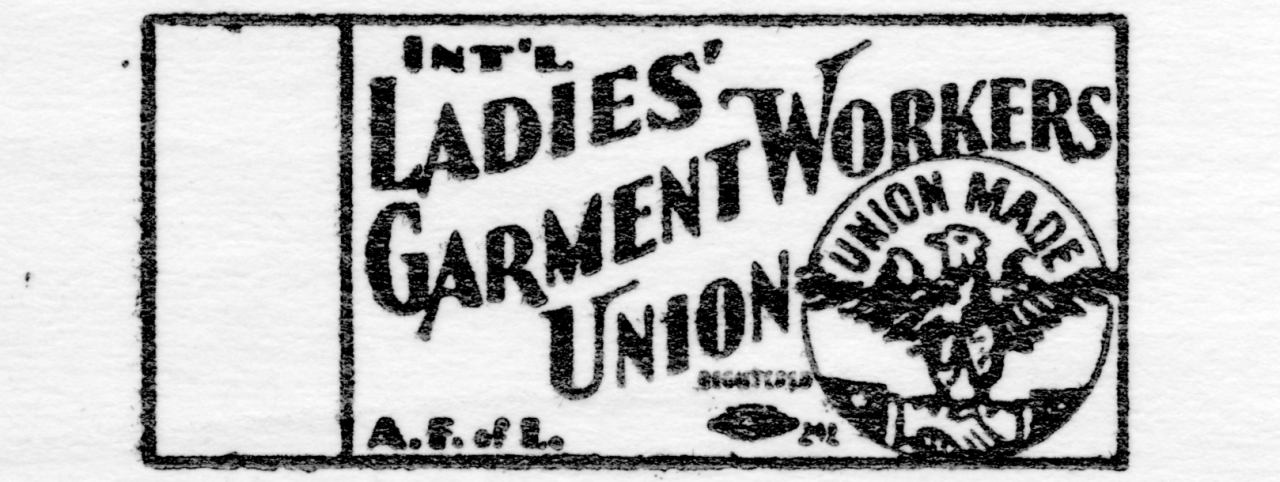
Time to reboot "Look for the Union Label"?
Look for the union label when you are buying that coat, dress, or blouse. Remember somewhere our union's sewing, our wages going to feed the kids and run the house.
--"Look for the Union Label," a song by Paula Green, with music by Malcolm Dodds
Do you remember the "Union Label" television advertisements from the 1970s and early 80s? A representative of the International Ladies Garment Workers Union (now UNITE, Union of Needletrades, Industrial and Textile Employees) would speak directly to the camera about the benefits of buying union-made clothing, then a diverse chorus of members would sing that catchy jingle. Some 40 years on, I still remember all the words and the tune.
The American labor movement has been struggling for decades, sidelined by federal and state laws that have stripped unions of their bargaining power, and flummoxed by big economic shifts; unions have not been as successful organizing service economy workers as they had been in manufacturing shops. (Caleb Crain provides an excellent overview of the factors contributing to labor's decline, including countless self-inflicted wounds, in the August 26 issue of The New Yorker.)
Alas, workers desperately need institutions that look out for their rights. Automation and the rise of the gig economy are just two major shifts that are changing the nature of work in favor of employers. (Full disclosure: I am not a member of a union, but Fast Company's newsroom is represented by the Writers Guild of America, East.)
Unions face a huge uphill battle. Steven Greenhouse, The New York Times's labor reporter, notes that companies outspent labor 16 to 1 in the 2015-2016 election cycle. And even as the CEOs of some of the biggest global corporations now say they are committed to leading businesses for the benefit of customers, employees, suppliers, and communities—in addition to investors—it seems unlikely that they'll be rushing to voluntarily rushing to invite unions to the table. There's nary a mention of the labor movement or unions in the Business Roundtable's much discussed statement of purpose, though the business group says investing in employees "starts with compensating them fairly and providing important benefits. It also includes supporting them through training and education that help develop new skills for a rapidly changing world. We foster diversity and inclusion, dignity and respect."
Even if unions don't explicitly factor into the Business Roundtable's new framework, the labor movement should take a page from the group; after all, the simple idea that institutions should expand their universe of stakeholders makes sense not just for businesses but for schools, governments, and yes, unions.
Consider the success the St. Paul Federation of Teachers has had in allying with parents and community groups around shared goals of smaller class sizes and greater access to nurses. Teachers in Arizona, a conservative state, also sought to engage with a wide-ranging constituency in its 2018 protests. "The turning point occurred when we went into our communities and spoke with our neighbors and friends about what was happening," Noah Karvelis, a Phoenix elementary school teacher writes in a piece in Rethinking Schools. " In response to walk-ins, town halls, and car-window painting events for parents, the community threw their support behind the teachers and the entire tide shifted." (The state met only some of the Arizona teachers' demands, and two lawmakers later introduced bills that would limit teachers' political speech.)
It might even be time for unions to launch a charm offensive. One MIT study suggests nearly half of non-union workers would like to join one. Employees in Silicon Valley have shown an ability and a willingness to stage walk-outs and protests when they disagree with their bosses. Perhaps it is time to find the 2019 equivalent of "Look for the Union Label." Labor may find many frustrated workers who are willing to sing along.
TellMed Strategies
4yIt's an interesting thought. I wonder, however, if in the age of social media if it's easier for workers to organize themselves now than in the early days of unions. Certainly, we all our a debt to unions which laid the groundwork for our generation of workers to have a voice at any job.
Clean energy and EV writer
4yNice piece, Stephanie. Indeed, gig workers want to join the union, but aren’t allowed. And it seems that the rise of unions (which I support) has a funny side effect - it makes it harder for gig workers to be hired and thus join a union, and the gig workers get none of the benefits yet are given as much responsibility as those staffers who are in the union.